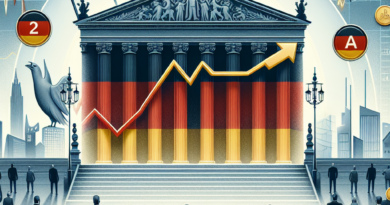Global economic, what crisis? 4 points to understand where we have arrived
Global economy increasingly in crisis? The data that emerged this week offer a still uncertain picture of the direction of global recovery.
In 4 points, a summary of what has happened in recent days, between macro data and market expectations, and why there are both lights and shadows on growth.
Inflation has fallen in both the US and the UK and this has strengthened predictions that central banks on both sides of the Atlantic will start cutting interest rates by the middle of next year.
Meanwhile, recovery expectations across Europe are improving, but the recovery remains fragile especially in the Eastern European Union.
The GDP recovery underway in China and Japan is also unstable, due, among other factors, to the slowdown in consumption.
Is the global economy really in crisis? 4 points to photograph the current situation, with a focus on the main world powers.
1.
USA US inflation recorded a general slowdown in October and the data has strengthened bets on an early rate cut by the Fed, now estimated as early as the first half of next year.
Maximum alert, however, on the gap in the US real estate market.
New buyers are in fact crushed by mortgage rates of 8%, while those who have already bought a property can benefit from loans with charges of less than 3%.
Some good news: the rapidly growing number of Americans who own their homes outright.
The share of mortgage-free homes reached a record just below 40%.
2.
Europe Inflation in the UK fell to its lowest level in two years and this has encouraged investors to believe that the Bank of Engkand may cut rates next year.
The eurozone and its major economies will avoid recession thanks to the return of growth at the end of the year, helped by slowing inflation and a robust jobs market, according to new forecasts from the European Union.
Germany, which has fared worse than its peers in a prolonged manufacturing slump, is also expected to avoid a recession.
The recovery will however be more modest, in general for 2024, compared to previous estimates, as shown in the ISPI graph for the major economies: It is interesting to note that Italy is the only nation to see its growth forecast for 2024 improved.
Germany is clearly worsening.
The major economies of the Eastern European Union are seen recovering, albeit fragilely.
The picture remains cloudier than ever in this area, with inflation slowly easing in the coming months.
The manufacturing sector is also reeling from falling demand in the euro area.
3.
China and Japan The Japanese economy reversed course over the summer.
The country's recovery remains fragile, calling for continued support from the Bank of Japan and the government.
Gross domestic product fell at an annual rate of 2.1% in the third quarter, largely due to falling business spending, a failure to recover in consumer demand and rising imports.
In China, consumption slowed and private business confidence lost momentum in October, according to independent polls and alternative data suggesting the economic recovery remains in trouble.
4.
Argentina Among the emerging countries, the economic situation of Argentina stands out, also dealing with the delicate electoral round to choose the president.
A graph developed by ISPI makes the dramatic explosion of inflation clear: Consumer prices in the Latin American nation last month increased at the fastest pace in 30 years, as the country tried to emerge from hyperinflation.
The nation is on the brink of default.




